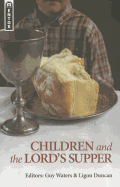At what age should children first participate in The Lord’s Supper? This article first appeared here in 2011 as part of a commitment to a publisher to review a certain book* and brought a number of comments. For that reason, I decided to run it again today**.
The two children sitting next to me — a boy about six and a girl of four or five — were fidgeting during the entire service. They spent most of the sermon time drawing pictures and there was a mild shoulder punch fight that took place during one of the worship songs where I thought the mom was going to split the kids up by sitting between them, but apparently opted not to. When the communion elements were passed across our row, without hesitation the kids helped themselves. The mom definitely saw the kids each take a piece of bread and the small cup of juice, and wasn’t the least concerned.
I grew up in a tradition where receiving The Lord’s Supper, partaking of Communion or Eucharist, or whatever name your faith family chooses to call it, was reserved for adults and those entering adulthood. I was eleven years old the first time. Anything younger, for me, would have been too young.
 So when Christian Focus Publishing offered me a chance to review Children and the Lord’s Supper, I had hoped this book would address the question in clear and unmistakable terms. I believe this topic is important as it bears on so many issues: church, doctrine, worship, parenting, the spiritual nurture of children, the Christian education of our youth.
So when Christian Focus Publishing offered me a chance to review Children and the Lord’s Supper, I had hoped this book would address the question in clear and unmistakable terms. I believe this topic is important as it bears on so many issues: church, doctrine, worship, parenting, the spiritual nurture of children, the Christian education of our youth.
Make no mistake about it, this is an excellent book. If you want to cover this topic in great detail, I can think of no better resource, and I will be most grateful to have this paperback in my library for any time that this topic surfaces. However, for all that, there are reasons why I think this is the wrong book for the majority of readers here.
First, this is a very academic reference work that would cause most of my friends to glaze over after the first dozen or so pages. The book is a collection of eight essays an introduction by editors Guy Waters and Ligon Duncan, which defines paedocommunion as “the admittance of a covenant child to the Lord’s Supper on the basis of his (sic) descent from at least one professing Christian parent.” (p. 11) Persons looking for a simple answer to the question, ‘Daddy, may I take communion?” — which is also the title of an existing book — would find 214 pages of answer to what they perceive as a simple ‘yes or no’ question; not unlike the uncle at the Christmas gathering who recites the entire workings of the internal combustion engine, when all you asked was a simple question as to the frequency of oil changes. Mind you, there are no simple answers here.
Another awkwardness for the North American reader is the use of the UK construction paedocommunion rather than the American which would favor the use of pedocommunion (only occurring 195 times in a Google search as opposed to over 28,000 for the UK spelling; which suggests something right there) just as we tend not to speak of paedobaptism (46,000 on Google) preferring the spelling pedobaptism (a more balanced 17,000). This preoccupation with spelling is not a deal breaker, but is mentioned in passing here to highlight how North American readers would find this volume inaccessible at different levels. (When the absolute central focus of a book is a word that is spelled differently in both countries, perhaps it is time to consider a North American edition.)
More relevant is the Reformed perspective of the book. This book raises all the right issues, but does so in the context of a growing movement among some Reformed denominations to include younger children in the Lord’s Supper — some already do — to which there is apparently much consternation. We share the same scriptures of course, and everything presented in this volume is entirely relevant to all our churches, but one must first decide to get past the denominational perspective of the writers. In fairness, I should state that a couple of the writers do address the doctrinal understanding of the Lord’s Supper that is unique to the Roman Catholic mass, though this is done primarily for comparative purposes with the Presbyterian or Reformed view. And one writer views as inconsistent those Baptist groups which baptize children, but do not permit them access to the Communion table.
Which brings us to the meat of the book.
As it turns out, the issue of children of partaking of the communion elements is almost symptomatic to a deeper causal issue, namely our understanding of the relationship between the Lord’s Supper and Passover. This is the true focus on which many of the arguments — mentioned or alluded to — hinge. Certainly Jesus instituted this sacred meal in the context of a passover meal, but how strongly does the parallel run? Children are allowed to participate in the modern passover — though some doubts arise as to, for example, the first such meal in the years immediately following the Exodus — so why not permit children at our New Covenant equivalent? And some even argue that point, as to whether or not there is a tacit understanding that the youngest of children do not truly partake of the passover meal since they are too young to ask the questions (or you could say, be active in the liturgy) that is required of the youngest; even arguing the obvious point that the very youngest would be too young to chew food.
One writer suggests that in Passover, Jesus was instituting something that fulfills or completes the entire sacrificial system (p. 32). Several of the writers point out that the Westminster Catechism (part 177) requires that the children be old enough to examine themselves, alluding to the words of institution in I Cor. 11, something I would term, if I may, the presence of “spiritual sentience,” a term which, as long as we’re quoting Google, occurs elsewhere 283 times.
Indeed, the book’s strongest premise is that we best remember the Lord’s death and atonement through the Lord’s Supper combined with active faith. (pp. 72-73) The book also considers the various warnings that the apostle issues addressing the situation of those who would be receiving the communion elements in an unworthy manner.
…This is a book review, and book reviews are highly subjective. I said at the beginning that this is indeed an excellent book, it’s just not going to fulfill the expectations of the average browser in the average Christian book shop, especially here in North America. But subjectively, my personal reward for studying this book was a deeper understanding of passover, admittedly not the book’s stated purpose. I am much richer for reading Children and the Lord’s Supper, but I am clearly not the typical Christian book consumer.
And if I’ve caused your eyes to glaze over today, may I suggest that as parents of young children you err on the side of caution. The children in the example I cited at the outset certainly had no sense of reverence for what was taking place, and may I suggest that by that lack of reverence they profaned the moment or occasion as it took place in their part of the auditorium.
“Then Jesus declared, “I am the bread of life. Whoever comes to me will never go hungry, and whoever believes in me will never be thirsty.” John 6:35 NIV
*The book is still available in both the US and UK. ISBN 9781845507299
**This article, combined with another one on the same topic, is also available at this link.
 I thought it interesting that one of the pieces I studied in preparation for yesterday’s post suggested that the parents of children who would be strongly opposed doctrinally to infant baptism have no issues with their non-infant children being baptized very young. Another article described a boy so young they had to ‘float’ him over to the pastor, since he couldn’t touch the bottom.
I thought it interesting that one of the pieces I studied in preparation for yesterday’s post suggested that the parents of children who would be strongly opposed doctrinally to infant baptism have no issues with their non-infant children being baptized very young. Another article described a boy so young they had to ‘float’ him over to the pastor, since he couldn’t touch the bottom.










